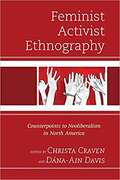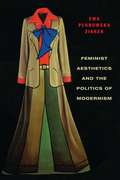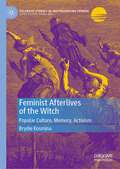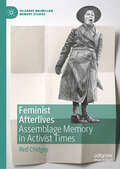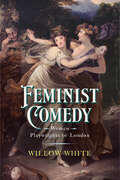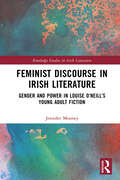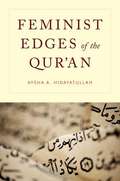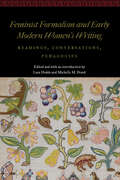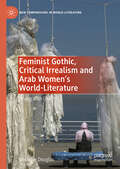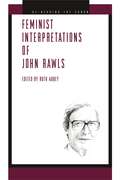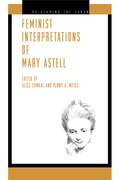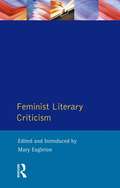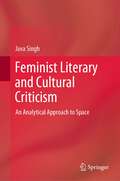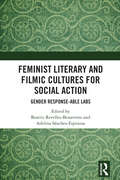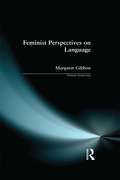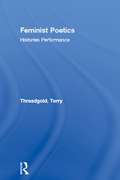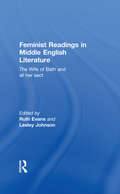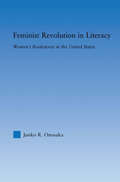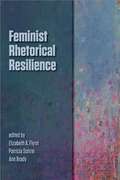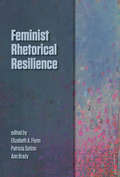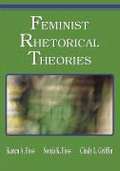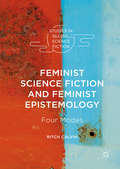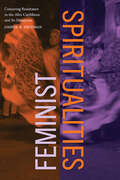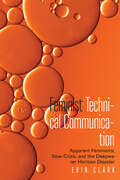- Table View
- List View
Feminist Activist Ethnography: Counterpoints to Neoliberalism in North America
by Khiara M. Bridges Iris López Christa Craven Elizabeth Chin Dána-Ain Davis Faye V. Harrison Mary K. Anglin Aimee Cox Michelle Marzullo Scott Lauria Morgensen Gina Pérez Tabitha Steager Beth A. Uzwiak Jennifer R. WiesWriting in the wake of neoliberalism, where human rights and social justice have increasingly been subordinated to proliferating “consumer choices” and ideals of market justice, contributors to this collection argue that feminist ethnographers are in a key position to reassert the central feminist connections between theory, methods, and activism. Together, we suggest avenues for incorporating methodological innovations, collaborative analysis, and collective activism in our scholarly projects. What are the possibilities (and challenges) that exist for feminist ethnography 25 years after initial debates emerged in this field about reflexivity, objectivity, reductive individualism, and the social relevance of activist scholarship? How can feminist ethnography intensify efforts towards social justice in the current political and economic climate? <p><p>This collection continues a crucial dialog about feminist activist ethnography in the 21st century—at the intersection of engaged feminist research and activism in the service of the organizations, people, communities, and feminist issues we study.
Feminist Aesthetics and the Politics of Modernism (Columbia Themes in Philosophy, Social Criticism, and the Arts)
by Ewa Płonowska ZiarekEwa Ziarek fully articulates a feminist aesthetics, focusing on the struggle for freedom in women's literary and political modernism and the devastating impact of racist violence and sexism. She examines the contradiction between women's transformative literary and political practices and the oppressive realities of racist violence and sexism, and she situates these tensions within the entrenched opposition between revolt and melancholia in studies of modernity and within the friction between material injuries and experimental aesthetic forms. Ziarek's political and aesthetic investigations concern the exclusion and destruction of women in politics and literary production and the transformation of this oppression into the inaugural possibilities of writing and action. Her study is one of the first to combine an in-depth engagement with philosophical aesthetics, especially the work of Theodor W. Adorno, with women's literary modernism, particularly the writing of Virginia Woolf and Nella Larsen, along with feminist theories on the politics of race and gender. By bringing seemingly apolitical, gender-neutral debates about modernism's experimental forms together with an analysis of violence and destroyed materialities, Ziarek challenges both the anti-aesthetic subordination of modern literature to its political uses and the appreciation of art's emancipatory potential at the expense of feminist and anti-racist political struggles.
Feminist Afterlives of the Witch: Popular Culture, Memory, Activism (Palgrave Studies in (Re)Presenting Gender)
by Brydie KosminaThe book investigates the witch as a key rhetorical symbol in twentieth- and twenty-first century feminist memory, politics, activism, and popular culture. The witch demonstrates the inheritance of paradoxical pasts, traversing numerous ideological memoryscapes. This book is an examination of the ways that the witch has been deployed by feminist activists and writers in their political efforts in the twentieth century, and how this has indelibly affected cultural memories of the witch and the witch trials, and how this plays out in popular culture representations of the symbol through the twentieth and twenty-first centuries. Consequently, this book considers the relationship between popular culture and media, activist politics, and cultural memory. Using hauntological theories of memory and temporality, and literary, screen, and cultural studies methodologies, this book considers how popular culture remembers, misremembers, and forgets usable pasts, and the uses (and misuses) of these memories for feminist politics. Given the ubiquity of the witch in popular culture, politics and activism since 2016, this book is a timely examination of the range of meanings inherent to the figure, and is an important study of how cultural symbols like the witch inherit paradoxical memories, histories, and politics. The book will be valuable for scholars across disciplines, including witchcraft studies, feminist philosophy and history, memory studies, and popular culture studies.
Feminist Afterlives: Assemblage Memory in Activist Times (Palgrave Macmillan Memory Studies)
by Red ChidgeyThis book interrogates why feminist memories matter. Feminist Afterlives explores how the images, ideas and feelings of past liberation struggles become freshly available and transmissible. In doing so, Red Chidgey examines how popular feminist memories travel as digital and material resources across protest, heritage, media, commercial and governmental sites, and in connection with the concerns and conditions of the present. Central case studies track repeated invocations to militant suffragettes and the We Can Do It! post-feminist icon over time and space. Assembling interviews, archival research and ethnographic accounts with provocative examples drawn from postfeminist media culture, a UNESCO heritage bid, protest at the London 2012 Olympic Games, and activist remembrance in zines and blogs, this is a broad-ranging study of ‘restless’ feminist pasts – both real and imagined. Richly researched and argued, this volume offers an original framework of ‘assemblage memory’ and sets out a new research agenda for the intersections between everyday activism, protest, and memory practices.
Feminist Comedy: Women Playwrights of London (EARLY MODERN FEMINISMS)
by Willow WhiteFeminist Comedy: Women Playwrights of London identifies the eighteenth-century comedic stage as a key site of feminist critique, practice, and experimentation. While the history of feminism and comedy is undeniably vexed, by focusing on five women playwrights of the latter half of the eighteenth century--Catherine Clive, Frances Brooke, Frances Burney, Hannah Cowley, and Elizabeth Inchbald--this book demonstrates that stage comedy was crucial to these women’s professional success in a male-dominated industry and reveals a unifying thread of feminist critique that connects their works. Though male detractors denied women’s comic ability throughout the era, eighteenth-century women playwrights were on the cutting edge of comedy and their work had important feminist influence that can be traced to today’s stages and screens.
Feminist Discourse in Irish Literature: Gender and Power in Louise O’Neill’s Young Adult Fiction (Routledge Studies in Irish Literature)
by Jennifer MooneyFeminist Discourse in Irish Literature addresses the role of young adult (YA) Irish literature in responding and contributing to some of the most controversial and contemporary issues in today’s modern society: gender, and conflicting views of power, sexism and consent. This volume provides an original, innovative and necessary examination of how “rape culture” and the intersections between feminism and power have become increasingly relevant to Irish society in the years since Irish author Louise O’Neill’s novels for young adults Only Ever Yours and Asking For It were published. In consideration of the socio-political context in Ireland and broader Western culture from which O’Neill’s works were written, and taking into account a selection of Irish, American, Australian and British YA texts that address similar issues in different contexts, this book highlights the contradictions in O’Neill’s works and illuminates their potential to function as a form of literary/social fundamentalism which often undermines, rather than promotes, equality.
Feminist Edges Of The Qur'an
by Aysha HidayatullahAysha A. Hidayatullah offers the first comprehensive examination of contemporary feminist Qur'anic interpretation, exploring its dynamic challenges to Islamic tradition and contemporary Muslim views of the Qur'an. She analyzes major feminist readings of the Qur'an beginning in the late twentieth century, synthesizing their common concepts and methods and revealing their vital part in the development of the nascent field of Qur'anic tafsir (exegesis).Hidayatullah contributes her own critical assessment of feminist ''impasses'' in the Qur'anic text and the field's appeals to the principles of equality and justice. She expands these observations into a radical critique of feminist approaches to the Qur'an, arguing that the feminist exegeticalendeavor has reached a point of irresolvable contradiction by making claims about the Qur'an that are not fully supported by the text. Hidayatullah outlines major challenges to the authority of feminist interpretations of the Qur'an and interrogates the feminist premises on which they have relied, questioning the viability of current strands of feminist Qur'anic interpretation and proposing a major revision of its exegetical positions.An innovative work of Muslim feminist theology, this volume offers an essential contribution to conversations about feminist tafsir and asking bold questions at the ''edge'' of Qur'anic interpretation.
Feminist Formalism and Early Modern Women's Writing: Readings, Conversations, Pedagogies (Women and Gender in the Early Modern World)
by Michelle M. Dowd Lara DoddsFeminist Formalism and Early Modern Women&’s Writing reexamines the relationship between gender and form in early modern women&’s writing in essays that elaborate the specific literary strategies of women writers, that examine women&’s debts to and appropriations of different literary genres, and that offer practical suggestions for the teaching of women&’s texts in several different contexts. Contributors explore the possibility of feminist formalism, a methodology that both attends to the structural, rhetorical, and other formal techniques of a given text and takes gender as a central category of analysis. This collection contends that feminist formalism is a useful tool for scholars of the early modern period and for literary studies more broadly because it marries the traditional questions of formalism—including questions of style, genre, and literary history—with the political and cultural concerns of feminist inquiry. Contributors reposition works by important women writers—such as Margaret Cavendish, Hester Pulter, Mary Wroth, and Katherine Philips—as central to the development of English literary tradition. By examining a variety of texts written by women, including recipes, emblems, exchanges, and poetry, Feminist Formalism and Early Modern Women&’s Writing contributes to existing scholarship on early modern women&’s writing while extending it in new and important directions.
Feminist Gothic, Critical Irrealism and Arab Women's World-Literature: 'Living with Ghosts' (New Comparisons in World Literature)
by Roxanne DouglasThis book moves the field of study of Arab women&’s writing on from the Anglophone preoccupation with the &“bravery&” that it takes to put pen to paper, and instead focuses on what the pen actually does. This book shows that Arab women writers innovate and utilise Gothic forms to &“live with the ghosts&” of foremothers, who represent lost knowledges about violence and feminised heritage. Examining contemporary Arab women&’s writing from the 1970s to the present through the lens of world-literary systems and feminist theory, this book details aesthetic patterns between decades, nations, and authors. The works of canonical Arab feminist authors such as Nawal El Saadawi and Hanan Al-Shaykh are put in conversation with those of contemporary authors such as Adania Shibli, Joumana Haddad, and Mansoura Ez Eldin. These works are linked through their creative feminist theorisations of loss and living.
Feminist Interpretations of John Rawls (Re-Reading the Canon)
by Ruth AbbeyIn Feminist Interpretations of John Rawls, Ruth Abbey collects eight essays responding to the work of John Rawls from a feminist perspective. An impressive introduction by the editor provides a chronological overview of English-language feminist engagements with Rawls from his Theory of Justice onward. Abbey surveys the range of issues canvassed by feminist readers of Rawls, as well as critics’ wide disagreement about the value of Rawls’s corpus for feminist purposes. The eight essays that follow testify to the continuing ambivalence among feminist readers of Rawls. From the perspectives of political theory and moral, social, and political philosophy, the contributors address particular aspects of Rawls’s work and apply it to a variety of worldly practices relating to gender inequality and the family, to the construction of disability, to justice in everyday relationships, and to human rights on an international level. The overall effect is to give a sense of the broad spectrum of possible feminist critical responses to Rawls, ranging from rejection to adoption.Aside from the editor, the contributors are Amy R. Baehr, Eileen Hunt Botting, Elizabeth Brake, Clare Chambers, Nancy J. Hirschmann, Anthony Simon Laden, Janice Richardson, and Lisa H. Schwartzman.
Feminist Interpretations of John Rawls: Feminist Interpretations Of John Rawls (Re-Reading the Canon)
by Ruth AbbeyIn Feminist Interpretations of John Rawls, Ruth Abbey collects eight essays responding to the work of John Rawls from a feminist perspective. An impressive introduction by the editor provides a chronological overview of English-language feminist engagements with Rawls from his Theory of Justice onward. Abbey surveys the range of issues canvassed by feminist readers of Rawls, as well as critics’ wide disagreement about the value of Rawls’s corpus for feminist purposes. The eight essays that follow testify to the continuing ambivalence among feminist readers of Rawls. From the perspectives of political theory and moral, social, and political philosophy, the contributors address particular aspects of Rawls’s work and apply it to a variety of worldly practices relating to gender inequality and the family, to the construction of disability, to justice in everyday relationships, and to human rights on an international level. The overall effect is to give a sense of the broad spectrum of possible feminist critical responses to Rawls, ranging from rejection to adoption.Aside from the editor, the contributors are Amy R. Baehr, Eileen Hunt Botting, Elizabeth Brake, Clare Chambers, Nancy J. Hirschmann, Anthony Simon Laden, Janice Richardson, and Lisa H. Schwartzman.
Feminist Interpretations of Mary Astell (Re-Reading the Canon)
by Penny A. Weiss Alice SowaalOften referred to as a proto-feminist, early modern English philosopher and rhetorician Mary Astell was a pious supporter of monarchy who wrote about gender equality at a time when society tightly constrained female agency. This diverse collection of essays situates her ideas in feminist, historical, and philosophical contexts. Focusing on Astell’s work and thought, this book explores the degree to which she can be considered a “feminist” in light of her adherence to Cartesianism, Christian theology, and Tory politics. The contributors explore the philosophical underpinnings of Astell’s outspoken advocacy for the autonomy and education of women; examine the intricacies underlying her theories of power, community, and female resistance to unlawful authority; and reveal the similarities between her own philosophy of gender and sexual politics and feminist theorizing today.A broad-ranging look at one of the most important female writers of the seventeenth and eighteenth centuries, this volume will be especially valuable to students and scholars of feminist history and philosophy and the early modern era.Aside from the editors, the contributors are Kathleen A. Ahearn, Jacqueline Broad, Karen Detlefsen, Susan Paterson Glover, Marcy P. Lascano, Elisabeth Hedrick Moser, Christine Mason Sutherland, and Nancy Tuana.
Feminist Literary Criticism (Longman Critical Readers)
by Mary EagletonLooks at the work of a range of critics, including Elaine Showalter, Kate Millett, Gayatri Chakravorty Spivak and the French feminists. The critical approaches encompass Marxist feminism and contemporary critical theory as well as other forms of discourse. It also provides an overview of the developments in feminist literary theory, and covers all the major debates within literary feminism, including "male feminism".
Feminist Literary and Cultural Criticism: An Analytical Approach to Space
by Java SinghFeminist Literary and Cultural Criticism explores inter-disciplinary connections across Cultural Anthropology, Geography, Psychology, and feminist literary criticism to develop a theoretical framework for spatial criticism. Using the spatial gynocritics framework developed in the book, it analyzes selected texts from five different genres–short-story, novel, film, cartoons, and OTT series, created by women. The creators discussed in the book constitute a transnational collectivity of women that shares common concerns about gender, environment, technology, and social hierarchies. They comprise a geographically and linguistically diverse group from India, Uruguay, Spain, Argentina, and the USA. The book offers immense potential for a comparative study on numerous aspects, among which the present work concentrates on the treatment of Space, demonstrating that spatial logic and grammar are essential elements of the feminist praxis. The book reveals the unexamined potential in the women creators’ praxis of destabilizing, decentring, and destroying the ascribed centres around which social arrangements are structured. Moreover, the book offers valuable analytic tools that add to scholarship in literary theory, comparative cultural studies, comparative literature, gender studies, feminist criticism, and interdisciplinary humanities. It is an indispensable aid to students and faculty in these areas of study, enabling them to critique texts from a fresh perspective.
Feminist Literary and Filmic Cultures for Social Action: Gender Response-able Labs
by Beatriz Revelles-Benavente Adelina Sánchez-EspinosaFeminist Literary and Filmic Cultures for Social Action: Gender Response-able Labs examines teaching and research practices under feminist new materialisms, affect theories and response-ability through literary and visual products, and offers possible bridges between academia and activism to create feminist interventions in contemporary neoliberal structures.Featuring chapters from contributors across a wide range of disciplines, this book follows a methodological framework that blends traditionally opposite categories, such as theory and practice, and explores contemporary literature and films as case studies within innovative “feminist response-able labs”.In Feminist Literary and Filmic Cultures for Social Action readers will encounter a collaborative trans-disciplinary toolbox which can be of use to multiple disciplines and an invaluable resource to advanced undergraduate students, postgraduate researchers and scholars in literary studies, film studies, feminist theories, new materialisms, and affective pedagogies
Feminist Perspectives on Language (Feminist Perspectives)
by Margaret GibbonThe Feminist Perspectives Series seeks to provide concise, accessible and engaging introductions to key feminist topics and debates. The texts in the series are designed to be used on a wide range of courses exploring feminist issues and are written by experienced teachers who are also well known in their respective fields. Each book in the series includes the most up-to-date statistics, research data, key sources and suggestions for further reading.Feminist Perspectives On Language provides an accessible introduction to this complex area. It redresses the balance of current feminist texts which tend to concentrate on discourse analysis and fail to connect with feminist thought in other disciplines such as sociology and politics. The text is divided into two parts, the first looks at language itself, how we learn language exploring such questions as; Does language free or trap us? Does our language affect how we come to understand the world around us? Is our language sexist? If so, does that reflect male dominance in society? and many more issues. Part Two explores questions of methodology and interpretation examining language in use, communication styles and the analysis of conversation.
Feminist Poetics: Performance, Histories
by Terry ThreadgoldFeminist Poetics in concerned with all of these questions, but also with the issue of rewriting an older poetics for what it does not say about the marginalisation of the feminine. The first half of the book traces the trajectory of a particular, feminine, academic subject learning to find her voice. The second half uses that differently disciplined voice to re-read the textual traces of the Governor murder stories, murders committed against white women and children by black men in Australia in 1900. This book is a feminist poetics for those who are engaged in the teaching of literacies, and in the making of Knowledge about literacies.
Feminist Readings in Middle English Literature: The Wife of Bath and All Her Sect
by Ruth Evans Lesley JohnsonThis volume, designed with the student reader in mind, is an indispensable blend of key essays in the field with specially commissioned new material by feminist scholars from the UK and the US. It includes a diversity of texts and feminist approaches, a substantial and very illuminating introduction by the editors, and an annotated list of Further Reading, offering preliminary guidance to the reader approaching the topic of gender and medieval literature for the first time. Works and writers covered include: * Chaucer * Margery Kempe * Christine de Pisan * The Katherine group of Saints' Lives * Langland's Piers Plowman * Medieval cycle drama Students of both medieval and feminist literature will find this an essential work for study and reference.
Feminist Revolution in Literacy: Women's Bookstores in the United States (Studies in American Popular History and Culture)
by Junko OnosakaThis book examines the history of women's bookstores in the US from the 1970s to the 1990s. It establishes that women's bookstores played an important role in feminism by enabling the dissemination of women's voices and thereby helping to sustain and enrich the women's movement. They improved women's literacy - their abilities to read, write, publish, and distribute women's voices and visions - and helped women to instigate a feminist revolution in literacy.
Feminist Rhetorical Resilience
by Ann Brady Elizabeth A Flynn Patricia SotirinAlthough it is well known in other fields, the concept of "resilience" has not been addressed explicitly by feminist rhetoricians. This collection develops it in readings of rhetorical situations across a range of social contexts and national cultures. Contributors demonstrate that resilience offers an important new conceptual frame for feminist rhetoric, with emphasis on agency, change, and hope in the daily lives of individuals or groups of individuals disempowered by social or material forces. Collectively, these chapters create a robust conception of resilience as a complex rhetorical process, redeeming it from its popular association with individual heroism through an important focus on relationality, community, and an ethics of connection. Resilience, in this volume, is a specifically rhetorical response to complicated forces in individual lives. Through it, Feminist Rhetorical Resilience widens the interpretive space within which rhetoricians can work.
Feminist Rhetorical Resilience
by Elizabeth A. Flynn, Patricia Sotirin and Ann BradyAlthough it is well known in other fields, the concept of “resilience” has not been addressed explicitly by feminist rhetoricians. This collection develops it in readings of rhetorical situations across a range of social contexts and national cultures. Contributors demonstrate that resilience offers an important new conceptual frame for feminist rhetoric, with emphasis on agency, change, and hope in the daily lives of individuals or groups of individuals disempowered by social or material forces. Collectively, these chapters create a robust conception of resilience as a complex rhetorical process, redeeming it from its popular association with individual heroism through an important focus on relationality, community, and an ethics of connection. Resilience, in this volume, is a specifically rhetorical response to complicated forces in individual lives. Through it, Feminist Rhetorical Resilience widens the interpretive space within which rhetoricians can work.
Feminist Rhetorical Theories
by Sonja K. Foss Cindy L. Griffin Karen A. FossFeminist Rhetorical Theories offers feminist rhetorical theories developed from the works of nine feminist theorists who offer important insights into rhetoric and communication? Chris Kramarae, Bell Hooks, Gloria Anzaldua, Mary Daly, Starhawk, Paula Gunn Allen, Trinh T. Minh-ha, Sally Miller Gearhart, and Sonia Johnson. Each of the theories is explicated in terms of the nature of the world or the realm for rhetoric explicated by the theorist, the theorist's definition of feminism, the nature of the rhetor or the kind of agent the theorist sees as acting in the world, and the rhetorical options envisioned by the theorist as available to rhetors. The resulting theories of rhetoric, which are substantially different from traditional rhetorical theories, re-vision rhetoric and encourage scholars to rethink many traditional rhetorical constructs.
Feminist Science Fiction and Feminist Epistemology
by Ritch CalvinThis book argues that feminist science fiction shares the same concerns as feminist epistemology challenges to the sex of the knower, the valuation of the abstract over the concrete, the dismissal of the physical, the focus on rationality and reason, the devaluation of embodied knowledge, and the containment of (some) bodies. Ritch Calvin argues that feminist science fiction asks questions of epistemology because those questions are central to making claims of subjectivity and identity. Calvin reveals how women, who have historically been marginal to the deliberations of philosophy and science, have made significant contributions to the reconsideration and reformulation of the epistemological models of the world and the individuals in it. "
Feminist Spiritualities: Conjuring Resistance in the Afro-Caribbean and Its Diasporas (SUNY series, Afro-Latinx Futures)
by Joshua R. DeckmanFeminist Spiritualities aims to complicate contemporary debates surrounding Black/Latinx experiences within a critical framework of decolonial thought, women of color feminisms, politicized emotional structures, and anti-imperial politics. Joshua R. Deckman considers literary and cultural productions from Puerto Rico, the Dominican Republic, Haiti, Cuba, and their diasporas in the United States, exploring epistemic spaces that have historically been marked as irrational and inconsequential for the production of knowledge—including social media posts, song lyrics, public writings, speeches, and personal interviews. Analyzing works by Yolanda Arroyo Pizarro, Mayra Santos-Febres, Rita Indiana Hernández, Ana-Maurine Lara, Elizabeth Acevedo, María Teresa Fernández, Nitty Scott, Lxs Krudxs Cubensi, and Ibeyi, Deckman shows how these authors develop afro-epistemologies grounded in Caribbean feminist spiritualities and manifest a commitment to finding joy and love in difference. Literary, anthropological, and more, Feminist Spiritualities weaves through a series of fields and methodologies in an undisciplined way to contribute new close readings of recent works and fresh assessments of well-known ones.
Feminist Technical Communication: Apparent Feminisms, Slow Crisis, and the Deepwater Horizon Disaster
by Erin ClarkFeminist Technical Communication introduces readers to technical communication methodology, demonstrating how rhetorical feminist approaches are vital to the future of technical communication. Using an intersectional and transcultural approach, Erin Clark fuses the well-documented surge of work in feminist technical communication throughout the 1990s with the larger social justice turn in the discipline. The first book to situate feminisms and technical communication in relationship as the focal point, Feminist Technical Communication traces the thread of feminisms through technical communication’s connection to social justice studies. Clark theorizes “slow crisis,” a concept made readable to technical communicators by apparent feminisms that can help technical communicators readily recognize and address social justice problems. Clark then applies this framework to the Deepwater Horizon Disaster, an extended crisis that has been publicly framed by a traditional view of efficiency that privileges economic impact. Through rich description of apparent feminist information-gathering techniques and a layered analysis this study offers application far beyond this single disaster, making available new crisis-response possibilities that consider the economy without eliding ecological and human health concerns. Feminist Technical Communication offers a methodological approach to the systematic interrogation of power structures that operate on hidden misogynies. This book is useful to technical communicators, scholars of technical communication and rhetoric, and readers interested in gender studies and public health and is an ideal text for graduate-level seminars focused on feminisms, social justice, and cultural studies.
